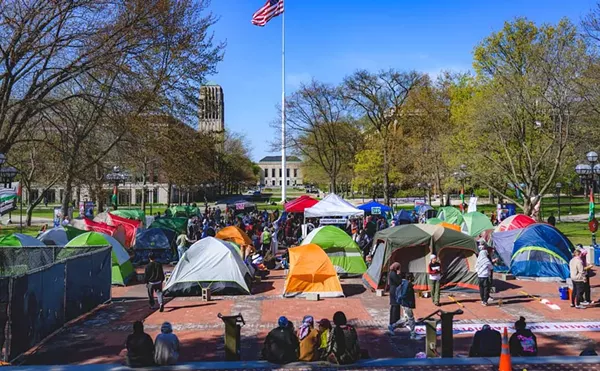
Audio By Carbonatix
[
{
"name": "GPT - Leaderboard - Inline - Content",
"component": "35519556",
"insertPoint": "5th",
"startingPoint": "3",
"requiredCountToDisplay": "3",
"maxInsertions": 100,
"adList": [
{
"adPreset": "LeaderboardInline"
}
]
}
]
A volunteer basketball coach at the Education Achievement Authority's Henry Ford High School has been formally charged, by the Wayne County Prosecutor's office, for having inappropriate sexual contact with a 15-year old student.
According to the Detroit Free Press, Kevin Orr-Matthews, 25, has been charged with first-degree criminal sexual conduct and third-degree criminal sexual conduct. Orr-Mathews, who was not on staff at the school, began texting with the teen in September and allegedly drove to her house where, per the prosector's office, he had "inappropriate sexual contact with her in his car."
This is not the first time we've heard of sexual harassment or assault on K-12 campuses in the Detroit metro area. Former Detroit City Council president Charles Pugh is currently heading to court to address a civil suit filed by a former Detroit Public Schools student alleging Pugh sexually harassed him. Then there was the case from last year where a 26-year old math teacher at DPS's Clippert Academy, Zachary Taylor, was accused of having an inappropriate relationship with a 14-year old student. Taylor was accused of sending lewd text messages to 7th grade student in his math class. (As an interesting aside,Taylor, who was a Teach for America corps member was featured in a June 2014 article by Rochelle Riley about how DPS needed more "dedicated" teachers like himself). These are just two of the dozens of cases that came up in a simple google search of "detroit, sexual assault, high school."
While higher ed sexual assault cases have garnered increased media attention over the years, the K-12 world, which includes schools like Henry Ford High and Clippert, remains particularly untouched. Stories that do make it into the news (Steubenville, Maryville, Rehtaeh Parsons)come across as sensationalized, one-off reporting ventures — replete with one word identifiers — that leave bigger questions about K-12 sexual harassment and assault not only untouched but with no guiding questions or roadmap.
"Very few people want to think about their children being raped or assaulted on a college campus by another student. That is times a million when it comes to high school," says Colby Bruno, Senior Legal Counsel at the Victim Rights Law Center in Boston. While Bruno says there are likely far more cases than ever make the news, one of the biggest issues with K-12 sexual assault and harassment cases is they are often mishandled. She blames this on two things: we live in a culture where people don't believe the victim and also because school administrators are not properly trained in how to handle cases when it comes to their attention. "K-12 campuses are 10 years behind colleges," she says.
According to the US Department of Education, between 2009 and 2013 there were 105 K-12 sexual violence complaints reported to the Office for Civil Rights. Complaints sent to OCR are specifically about Title IX — aka the school did not make proper accommodations after the assault came to light to ensure the victim received equal access to educational opportunities violations — which means the actual number of sexual violence cases could have been much higher, considering teens are either not coming forward, are unaware that they have a right to report the incident to the federal government if their school does not take action to properly mediate the situation, or are pleased with the way their school handled the situation. In other words, just because the Henry Ford and Clippert cases have been pursued in the criminal justice arena, does not mean they were necessarily reported to the OCR (typically parents, students or a concerned teacher reports a sexual harassment or assault related Title IX violation).
This lack of federal reporting can mean that a culture of sexual harassment can persist on K-12 campuses, without the administration taking any real efforts to shift the school zeitgeist. Catherine Hill of the American Association of University Women, who has spent many years researching sexual harassment on K-12 campuses, says this means that a lot of schools end up lumping sexual harassment under the banner of bullying, since most bullying legislation does not have financial repercussions for a school.
"It is possible for an individual to sue a school over bullying, but that legislation does not have the same kinds of teeth that Title IX has," says Hill, pointing to the fact that if a school fails to adhere to Title IX recommendations from OCR there can be monetary penalties.
Between January and May 2015, there were 34 sexual violence cases under investigation by the OCR in 33 districts across the United States. Despite us knowing there has been more than one case of sexual violence in a Michigan school there was only one Michigan district on the list: South Lakes Schools, which serves students from St. Clair Shores, Eastpointe, and the Village of Grosse Pointe Shores. The investigation into the Title IX violation started on Dec. 22, 2014.
According to the Detroit Free Press, Kevin Orr-Matthews, 25, has been charged with first-degree criminal sexual conduct and third-degree criminal sexual conduct. Orr-Mathews, who was not on staff at the school, began texting with the teen in September and allegedly drove to her house where, per the prosector's office, he had "inappropriate sexual contact with her in his car."
This is not the first time we've heard of sexual harassment or assault on K-12 campuses in the Detroit metro area. Former Detroit City Council president Charles Pugh is currently heading to court to address a civil suit filed by a former Detroit Public Schools student alleging Pugh sexually harassed him. Then there was the case from last year where a 26-year old math teacher at DPS's Clippert Academy, Zachary Taylor, was accused of having an inappropriate relationship with a 14-year old student. Taylor was accused of sending lewd text messages to 7th grade student in his math class. (As an interesting aside,Taylor, who was a Teach for America corps member was featured in a June 2014 article by Rochelle Riley about how DPS needed more "dedicated" teachers like himself). These are just two of the dozens of cases that came up in a simple google search of "detroit, sexual assault, high school."
While higher ed sexual assault cases have garnered increased media attention over the years, the K-12 world, which includes schools like Henry Ford High and Clippert, remains particularly untouched. Stories that do make it into the news (Steubenville, Maryville, Rehtaeh Parsons)come across as sensationalized, one-off reporting ventures — replete with one word identifiers — that leave bigger questions about K-12 sexual harassment and assault not only untouched but with no guiding questions or roadmap.
"Very few people want to think about their children being raped or assaulted on a college campus by another student. That is times a million when it comes to high school," says Colby Bruno, Senior Legal Counsel at the Victim Rights Law Center in Boston. While Bruno says there are likely far more cases than ever make the news, one of the biggest issues with K-12 sexual assault and harassment cases is they are often mishandled. She blames this on two things: we live in a culture where people don't believe the victim and also because school administrators are not properly trained in how to handle cases when it comes to their attention. "K-12 campuses are 10 years behind colleges," she says.
According to the US Department of Education, between 2009 and 2013 there were 105 K-12 sexual violence complaints reported to the Office for Civil Rights. Complaints sent to OCR are specifically about Title IX — aka the school did not make proper accommodations after the assault came to light to ensure the victim received equal access to educational opportunities violations — which means the actual number of sexual violence cases could have been much higher, considering teens are either not coming forward, are unaware that they have a right to report the incident to the federal government if their school does not take action to properly mediate the situation, or are pleased with the way their school handled the situation. In other words, just because the Henry Ford and Clippert cases have been pursued in the criminal justice arena, does not mean they were necessarily reported to the OCR (typically parents, students or a concerned teacher reports a sexual harassment or assault related Title IX violation).
This lack of federal reporting can mean that a culture of sexual harassment can persist on K-12 campuses, without the administration taking any real efforts to shift the school zeitgeist. Catherine Hill of the American Association of University Women, who has spent many years researching sexual harassment on K-12 campuses, says this means that a lot of schools end up lumping sexual harassment under the banner of bullying, since most bullying legislation does not have financial repercussions for a school.
"It is possible for an individual to sue a school over bullying, but that legislation does not have the same kinds of teeth that Title IX has," says Hill, pointing to the fact that if a school fails to adhere to Title IX recommendations from OCR there can be monetary penalties.
Between January and May 2015, there were 34 sexual violence cases under investigation by the OCR in 33 districts across the United States. Despite us knowing there has been more than one case of sexual violence in a Michigan school there was only one Michigan district on the list: South Lakes Schools, which serves students from St. Clair Shores, Eastpointe, and the Village of Grosse Pointe Shores. The investigation into the Title IX violation started on Dec. 22, 2014.





